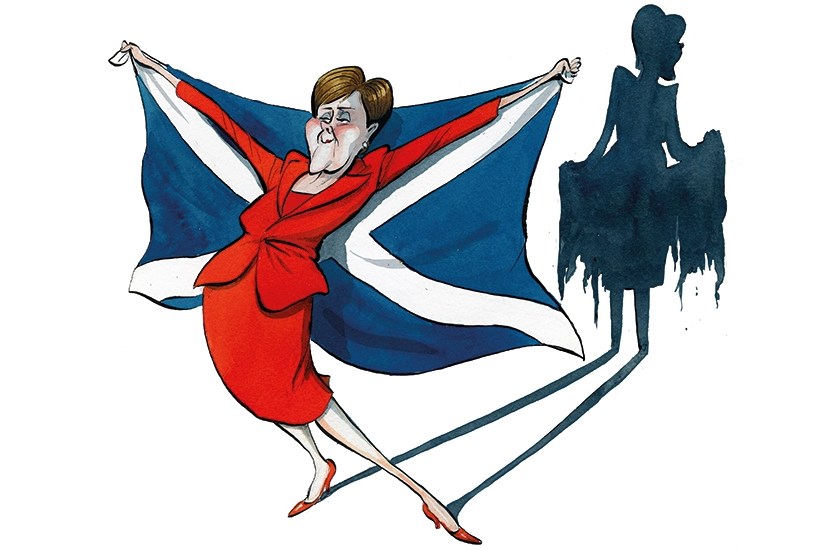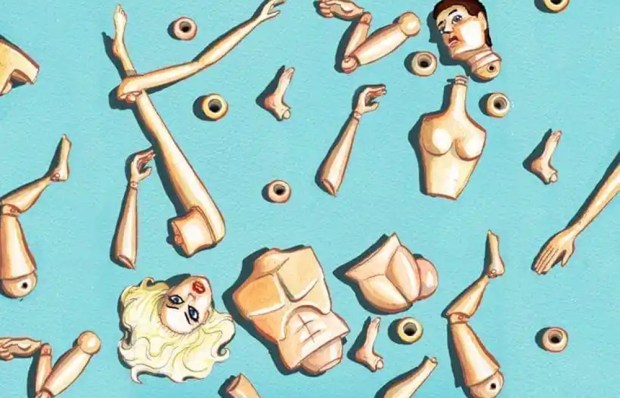Sometimes, Westminster unwittingly makes quite a good case for Scottish independence. Britain’s Covid emergency has ended, but the damage of the last year is enormous: the knock-on effects of lockdown can be seen in NHS waiting lists, the devastated high street, the mental health backlog and the 20,000 pupils who are absent from the school register. There is urgent work to do, yet the government is engaged in a battle to the death over who paid for wallpaper in Downing Street.
We see a Prime Minister at war with his ex-adviser, unable to rise above the fray and capitalise on the opportunity of his vaccine success. Then there’s the opposition, unable to oppose. It’s not hard to see why many Scots might opt to press the ‘eject’ button by voting for the Scottish National Party in the Holyrood election next week.
Nicola Sturgeon would use a majority for independence by starting an immediate campaign for a referendum that would dominate Scottish politics for years, to the exclusion of all other issues. It’s worth asking what precisely that would mean.
The issues facing Scots are identical to those faced in England: the Covid-19 crisis is in retreat, but the deep societal damage of a year of lockdowns is increasingly evident. Some 3,550 fewer cancer diagnoses were made in Scotland last year, a fall of nearly 14 per cent. Scotland’s NHS is in no shape to play catch-up: even before the pandemic, waiting times for long-term health procedures were already estimated to be worse than in England. Generally, public services are less well run north of the border.
As for children, lockdown has hit poorest pupils hardest. But already poor pupils in Scotland were little more than half as likely as their English counterparts to get to university. Never have Scots been in more need of focused, effective government. But if they end up with an SNP majority there will be a non-stop campaign for separation; every policy will be used to drive another wedge between Scotland and England.
Sturgeon has admitted to having made no calculations about the economic impact of independence — which is odd, given that independence is her party’s reason for existing. But its chief policy seems to be the suspension of disbelief.
The pandemic is expected to have left Scotland with a deficit of up to 25 per cent of GDP, higher than any other country in the world. Any country joining the European Union needs a deficit no higher than 3 per cent of GDP: independence would mean sado-austerity with cuts far bigger than anything attempted by David Cameron or George Osborne.
Scotland joining the EU would also mean — under EU rules — border controls with England and a consequent hammer blow to trade. North Sea revenues, even if they had not collapsed, would never fill this gap.
By being in the Union during the pandemic, Scotland benefited from the safety net of being in the UK. The furlough scheme was financed by the UK Treasury’s borrowing power. Scotland is now coming out of lockdown due to having vaccination levels that are higher, by some margin, than anywhere on the Continent. By no coincidence, Scotland’s Covid deaths are down by 99 per cent — the same as in England. No European country except Portugal can say the same.
Recovering from the pandemic will take a generation. A vote for the SNP would mean another wasted decade in Scotland, with all political energies being focused on the constitutional question rather than on repairing the damage. Nicola Sturgeon argues that independence is needed to deal with the country’s post-Covid problems. But it is hard to see how Scotland having to cut public spending while not having its own central bank would help address these issues.
The best case for the Union has been made by Anas Sarwar, the new leader of Scottish Labour, in recent weeks. His message is that Scotland needs a recovery, not a referendum. If that message fails, unionists have to face up to the grim truth that, after 14 years in power and despite its dismal record, the SNP has found a way to game the devolution system. By convincing the 45 per cent of pro-independence voters that national liberation lies around the corner, Sturgeon’s party can guarantee itself victory after victory.
Devolution was not intended to deliver independence. As one Labour grandee famously said, it would ‘kill nationalism stone dead’. Even Tony Blair, with his new long hair, now admits that this was a misjudgment: it instead gave secessionists a platform from which to pursue the un-doing of the United Kingdom.
A pro-independence majority next week will take the SNP closer than ever to this goal. If the Tories have any sense of preservation — of the country, and of their party — they should give Scotland their full attention in the remaining days of the campaign.
Got something to add? Join the discussion and comment below.
Get 10 issues for just $10
Subscribe to The Spectator Australia today for the next 10 magazine issues, plus full online access, for just $10.
You might disagree with half of it, but you’ll enjoy reading all of it. Try your first month for free, then just $2 a week for the remainder of your first year.














Comments
Don't miss out
Join the conversation with other Spectator Australia readers. Subscribe to leave a comment.
SUBSCRIBEAlready a subscriber? Log in